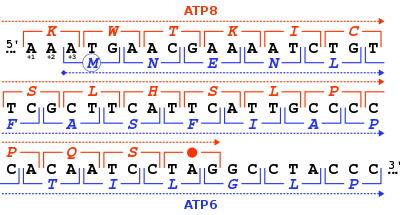
Back كودون توقف Arabic Stop kodon BBC Stop kodon BS Stop kodon Czech Stopcodon German Codón de terminación Spanish کدون پایان Persian Codon-stop French Códón Irish קודון סיום HE

In molecular biology, a stop codon (or termination codon) is a codon (nucleotide triplet within messenger RNA) that signals the termination of the translation process of the current protein.[1] Most codons in messenger RNA correspond to the addition of an amino acid to a growing polypeptide chain, which may ultimately become a protein; stop codons signal the termination of this process by binding release factors, which cause the ribosomal subunits to disassociate, releasing the amino acid chain.
While start codons need nearby sequences or initiation factors to start translation, a stop codon alone is sufficient to initiate termination.
- ^ Griffiths AJF, Miller JH, Suzuki DT, Lewontin RC, Gelbart WM (2000). "10. Molecular Biology of Gene Function: Genetic code: §Stop codons". An Introduction to Genetic Analysis (7th ed.). W.H. Freeman. ISBN 978-0-7167-3520-5. OCLC 42049331.